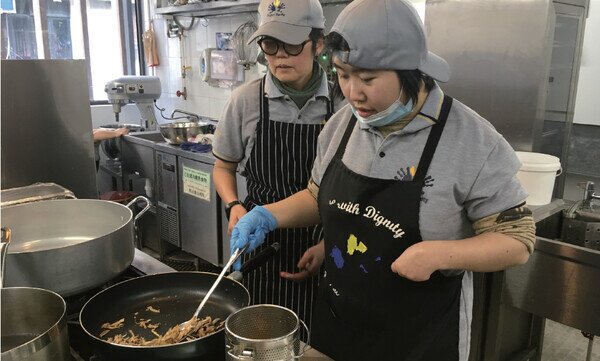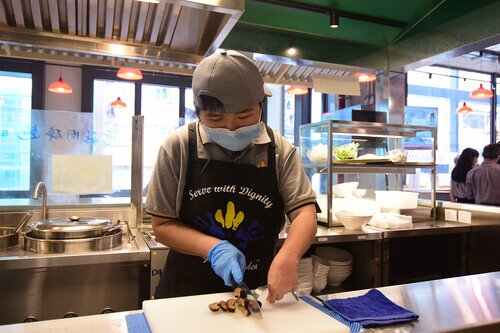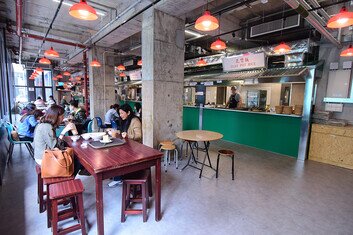Extraordinary Singaporean Cuisine: URA Introduces Social Enterprise to 618 Shanghai Street to Enable the Disabled
 Pei Ti (left) says with proper training and support, Carol (right) who has left hand disability can cook just as well as any able-bodied person.
Pei Ti (left) says with proper training and support, Carol (right) who has left hand disability can cook just as well as any able-bodied person.
Few people may have noticed the special details of food offered by Dignity Kitchen Hong Kong at 618 Shanghai Street besides its delicious taste of Singapore. While a bite of Bak Chor Mee is guaranteed mouth-watering, what is more worth-noting is that all dishes served at Dignity Kitchen are well-cooked by a group of stall workers with various physical disabilities or special needs, among them is Carol Wong, who suffers from left hand spasticity and has to work mainly with her right hand. Ong Pei Ti, trainer from Singapore who teaches cooking skills at Dignity Kitchen, said with proper training and support, a disabled person can cook just as well as any able-bodied person.
Dignity Kitchen, which has commenced operation in the URA’s 618 Shanghai Street since December last year, is run by Project Dignity, a social enterprise headquartered in Singapore. Last year the URA invited and facilitated Project Dignity to set up Dignity Kitchen in Hong Kong with an aim to assist local disadvantaged groups on career development through bringing to the city an innovative social enterprise model, in the hope that it can take root in the Yau Ma Tei and Mong Kok (Yau Mong) districts. At Dignity Kitchen, a variety of hawker food are offered at different food stalls (Dai Pai Dongs) which are reminiscent of the traditional culture of Dai Pai Dongs in Yau Mong area, therefore boosting the local characteristics of the revitalisation project. And with the introduction of such training base for helping the local disadvantaged groups to build up self-reliance, not only has the revitalised building been given new function, but the project itself is also capable of catering to people’s need through different activities and collaboration thereby fostering their livelihood and creating a better community.
Dignity Kitchen strives to provide training opportunities for people with physical disabilities or special needs, and arranges suitable jobs according to their abilities. Tailor-made tools are provided to assist them to cook various dishes with a purpose to fully realise their potentials and work independently, so that the ultimate goal of social integration and self-reliance of the disabled can be achieved eventually.

However for persons with disabilities, getting a job to earn a living in Hong Kong is no easy task. While only a few companies or organisations are willing to hire them, the biggest obstacle they face is the lack of training opportunities, rendering them difficult to acquire work skills to enhance employability. Carol recalled that before joining Dignity Kitchen, she did not know how to cook, and also because of her physical disability, she had difficulties in finding jobs. Even though Carol was once hired by a café in Kwun Tong, she was only assigned to do simple tasks such as serving breads without any training.
Many people with disabilities share similar difficult experience as Carol has encountered in job searching and work. "Hong Kong is a fast-paced society where restaurants cannot spare time to offer on-the-job training to its staff. If staff with disabilities are too slow to catch up, they will be blamed for throwing a wrench in the works. In fact, many people are ignorant of the traits and needs of persons with disabilities, while making rash judgement about them and deny them the opportunity," said Peh Ti.
Hence, to help disabled persons with employment difficulties, Dignity Kitchen strives to operate under the social enterprise model, on one hand providing disabled persons with job opportunities, with 90 percent of its employees being recruited from local disadvantaged groups with physical disabilities or special needs, while on the other hand equipping them with various culinary skills through substantial training in the hope that they can be self-reliant one day.
As Peh Ti remembered, Carol showed a lack of self-confidence when she first joined Dignity Kitchen as trainee at the end of last year. "At that time I taught her how to beat ground meat to make meatballs. She said to me: it is of course easier for you because you can beat meat with both hands. To encourage her I then showed her how to make meatballs with only one hand.” When Carol still hesitated, Peh Ti told her, “You have to try or you will never know it’s easy.” With Peh Ti’s encouragement, Carol decided to give it a try and was excited to see her first successful attempt using only one hand while the left side of her body was too weak and heavy for the task. With the help of tailor-made tools provided by Dignity Kitchen, Carol is able to carry out more cooking procedures than before. For example, she could hold mushrooms in place by using a curved fork with her left hand, and then cut them with a knife in her right hand.
Besides making meatballs and processing ingredients, Carol also learned how to blanch pork bones and fry dried small fish for stewing soup, in addition to food seasoning and presentation. After about two weeks’ training, Carol, who has been praised a fast learner, was able to prepare a bowl of Bak Chor Mee by herself from cutting the vegetables, mushrooms and meat to turning on the stove to cook noodles and meatballs. Carol even cooked noodles at home for her mother who gave a thumb up for the great taste.
At Dignity Kitchen, people with disabilities not only learn to cook, but also to be self-reliant. Peh Ti explained that their trainers and abled-bodied staff would not dominate over the disabled employees, but would allow them a full play of their abilities instead. "Trainees will be asked if they have encountered any problems during the work, and how they would solve these problems. They are encouraged to think more and build up their self-confidence." With appropriate training and assistance, people with disabilities can also stand on their own, integrate into the community and make their contributions.
Now besides running the noodle stall independently, Carol would offer help to her colleagues at the Laksa and Hainan Chicken Rice stalls when she has free time. Peh Ti is glad to see what Carol has achieved today. "I do not need to look after her anymore. She can do it (cooking work) all by herself and I have nothing to worry about,” she smiled.

